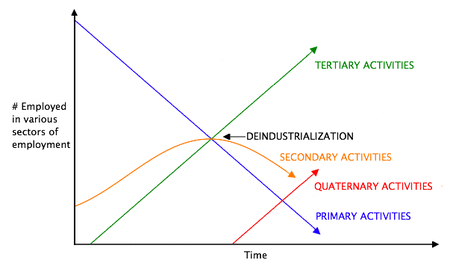Quaternary sector of the economy
| Economic sectors |
|---|
| Three-sector model |
|
| Additional sectors |
|
| Theorists |
| Sectors by ownership |
The quaternary sector of the economy is a way to describe a knowledge-based[1] part of the economy - which typically includes services such as information technology, information-generation and -sharing, media, and research and development, as well as knowledge-based services like consultation, education, financial planning, blogging, and designing.[2]
The quaternary sector is based on knowledge and skill. It consists of intellectual industries providing information services, such as computing and ICT (information and communication technologies), consultancy (offering advice to businesses) and R&D (research, particularly in scientific fields). According to some definitions, the quaternary sector includes other pure services, such as the entertainment industry, and the term has been used[by whom?] to describe media, culture, and government.

"Quaternary sector" is a further delineation of the three-sector hypothesis of industry in the sense that the quaternary sector refers to a part of the third or tertiary sector along with the quinary economic sector. It has been argued[by whom?] that intellectual services is distinct enough to warrant a separate sector and not be considered merely as a part of the tertiary sector.[citation needed] This sector evolves in well-developed countries and requires a highly educated workforce.[3]
Between them, the tertiary and quaternary sectors form the largest part of the UK economy, employing 76% of the workforce. The number of people who earn their living in these activities is increasing. Companies invest in the quaternary sector to promote further expansion.[citation needed] It is seen[by whom?] as a way to generate higher margins or returns on investment.[4] Research will be directed[by whom?] into cutting costs, tapping into markets, producing innovative ideas, new production methods and methods of manufacture, amongst others.[when?] To many industries, such as the pharmaceutical industry, the sector is the most valuable because it creates future secondary-sector branded products from which companies may profit.[citation needed]
References
- ^ Tor Selstad (1990). "The rise of the quaternary sector. The regional dimension of wisdom or knowledge-based services in Norway, 1970–1985 - Norsk Geografisk Tidsskrift - Norwegian Journal of Geography - Volume 44, Issue 1". informaworld. Retrieved 2010-06-17.
... knowledge-based services ...
{{cite news}}: Italic or bold markup not allowed in:|publisher=(help) - ^ Peter Busch (1967). "Tacit Knowledge in Organizational Learning". Tacit Knowledge in Organizational Learning. Retrieved 2010-06-17.
see page .. The quaternary sector of industry is the sector of industry that involves the intellectual services. That is research, development, and information.
{{cite news}}: Italic or bold markup not allowed in:|publisher=(help) - ^ "ICTs, industry and the new teacher model". Asian Correspondent. 2010-06-17. Archived from the original on July 30, 2012. Retrieved 2015-09-09.
In Australia, the service sector accounts for 70 per cent of the country's economic activity. Within the service sector, however, more intellectual activities such as government, education, culture and media, can be further defined as the 'quaternary' sector of economy. These activities are typically not measured in monetary value but they significantly contribute to the economy.
{{cite news}}: Italic or bold markup not allowed in:|publisher=(help); Unknown parameter|deadurl=ignored (|url-status=suggested) (help) - ^ press release (February 19, 2010). "TEXT-Fitch: Investment to increase in India's healthcare sector". Reuters. Retrieved 2015-07-23.
Fitch notes that newly commissioned hospitals and improved occupancy rates at existing ones will drive revenue growth. Better capacity utilisation and increased focus on higher-margin tertiary and quaternary healthcare services are expected to boost profitability, and improve cash flow from operations (CFO).
{{cite news}}: Italic or bold markup not allowed in:|publisher=(help)
External links
- Zoltan Kenessey, U.S. Federal Reserve Board. "Primary, Secondary, Tertiary and Quaternary Sectors of the Economy" (PDF). Review of Income and Wealth. Retrieved 2015-05-05.
